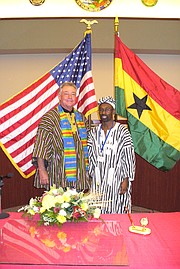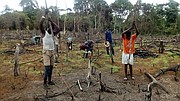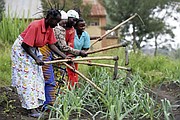Making a difference in people's lives a world apart
A cargo container of brand new agricultural equipment bound for the remote village of Assaasafofum, Ghana is about to arrive, and with it brings a change in centuries old methods of farming.
“It’s quite an exciting time — my village has never had mechanized farming,” Tribal Chief Dr. Kwesi Osei-Bonsu said. “It’s the first time we are going to mechanize the land — people are looking forward to it. Because it is new — everyone is waiting and watching to see how it will go. We have cleared about 25 acres of land and are making sure everything is set so when the truck arrives with the machinery, we’ll be ready for planting.”
The equipment, a John Deere 55 HP tractor with a front end loader and land clearing attachments, an IMANTS (PTO) power driven spader, a Rears PTO power driven stock shredder, a two-row John Deere corn planter, and a John Deere Gator utility vehicle loaded with a combination welder, generator, air compressor and a large tool box with English and metric tools and a supply of parts and consumables, all valued at roughly $100,000, is the generous donation of Roger Thieme, owner of Evergreen Implement in Othello.
“I appreciate Roger’s generosity so much — it is part of what God can do,” Osei-Bonsu said. “I met Roger about 15 years ago and I thank God that we were able to come together this year and make this materialize. He is playing a tremendous part in seeing us transform — myself — my people and change the way we do farming.”
Thieme recalled his first meeting with Osei-Bosu and a group of individuals from Ghana arriving in Othello with the dream of getting some help in starting “reclamation of their resources to improve the lives of their indigenous people.”
“The one person I remember well from that group was Dr. Kwesi Osei–Bonsu. About three months ago, I heard he was coming back to Othello and wanted to visit with me,” Thieme said. “He told me at the end of their wet season when the soil is dry enough to till for the dry season planting, it takes 20 people 30 days to hand till and prepare a 10-acre seed bed, then several weeks to hand plant those 10 acres.”
The actual method was to slash and burn vegetation and then take long poles and make a little hole in the ground, drop a seed in and then take another step and repeat the process. The equipment Thieme is supplying drastically changes that method and time it takes to plant and harvest their crops.
During Osei-Bonsu’s visit nearly two decades ago, a Sister City agreement between Othello and Wulensi, Ghana, where he is from, was established under the leadership of then Mayor Shannon McKay. This arrangement allowed donations made to Osei-Bonsu to be tax deductible. The donations, Thieme said, made at that time were mostly of older used items, “But it was a start.”
This journey of transformation for Osei-Bonsu and his people, however, didn’t begin just 15 years ago. It all started a quarter of a century back when the paths of Osei-Bonsu and then pastor of the Othello Nazarene Church, Bob Luhn, crossed in British Columbia.
“I first heard of Kwesi 25 years ago. He was doing some missionary work on Vancouver Island among some of the coastal Indians,” Luhn said. “I was intrigued with what he was doing so I invited him to come to Othello and speak at our church. We became friends and have remained friends ever since.”
“I’ve flown to London to be with him — flown to Ghana — he’s been to Othello 12 to 15 times to speak at various churches and schools and to speak with the city officials to establish a Sister City relationship. I think Othello is a special place for him just like Ghana is a special place for me.”
Kuhn said he hasn’t been to the village of Assaasafofum, but he has been to Wulensi — sent a tractor there — and a nearby village where he helped to restore a building that eventually was used as a secondary school.
“I’ve always wanted to work on projects that would help people help themselves — didn’t want to be in the handout business because the needs are so overwhelming you could spend an entire lifetime over there handing them something and it would just be a drop in the bucket,” said Luhn who is also a member of the Sister City Committee that raised close to $10,000 to buy the cargo container and make the necessary arrangements to ship the equipment arriving in Ghana. “But if you give them tools they can use to feed and educate themselves — we think we can do some transformation of communities.”
Osei-Bonsu said he values the relationship established with Luhn over the years and speaks highly of him as well.
“Bob is like my big brother from a different mother,” he said. “We go a long way back and I appreciate him very much. If it wasn’t for Bob, I wouldn’t have learned so much about people from a different race. Bob has taught me so well how to be effective with people — how to tolerate people — how to love people — how to cherish and respect people — he is the epitome of Christ. I have learned so much from him.”
During the time between his visit some 15 years ago and the one he made to Othello three month ago to speak with Thieme, Osei-Bonsu was appointed tribal chief over 247 villages and the focus for him shifted from Wulensi to Assaasafofum, where the current shipment of farm equipment is headed.
“In the meantime, the Sister City relationship started to go by the wayside including the renewal of it’s non profit status,” said Shawn Logan, Sister City Committee president. “But its non profit and 501C3 status was reestablished this year for the purpose of exchanging agricultural information and equipment as a means to get fertile crops growing in the region where Assaasafofum is located.”
Logan said former mayor Shannon McKay deserves much of the credit in the establishment of the Sister City treaty that formed the business and cultural exchange and resulted in the first visit to Ghana by a representative of Othello. Osei-Bonsu was so impressed by McKay’s enthusiasm to make the connection, he has named the first agricultural venue after him calling it, “The Shannon McKay Farm.”
A huge learning curve
As one could imagine, modernizing age-old methods of farming with power-generated equipment requires a huge learning curve. Osei-Bonsu is quick to agree.
“It will be very mentally difficult because change is not easy for people to adopt,” he said. “So we are praying that the minds of the people will be changed so it will be easier for us. We are looking between 3 to 5 years for this transformation to take place. Once they see the impact, change will be imminent.”
To help with their education in the safe operation and maintenance of the powered equipment, the people on Thieme’s team have developed and provided a complete video library that is being used for in-depth training prior to the arrival of the cargo container.
Thieme is also sending his on-site trainer Jim Baergren to Assaasafofum for two week to get tribesmen acclimated to the equipment.
“I don’t know how to thank him because in these difficult times — he has made it much easier and better for me and my people, Osei-Bonsu said. “We will always be indebted to him, Rich Mollotte, and Jim Baergren, who they are sending to come and assist us.”
No resistance from government officials
Taking assistance with the modernization of farming methods from people outside the continent of Africa, and more specific from the remote village of Assaasafofum, one might think Osei-Bonsu has met with a lot of resistance from government officials. Not so, he says.
“You would think that we might from past government,” Osei-Bonsu said. “But with the present government — like some sort of coincidence — we all have the same vision. It’s what’s inline with what the government of Ghana is trying to do. This couldn’t have been a better time to do this. The will of God in Ghana at this particular time is to see the fruition of this vision and dream He has given us come together.”









